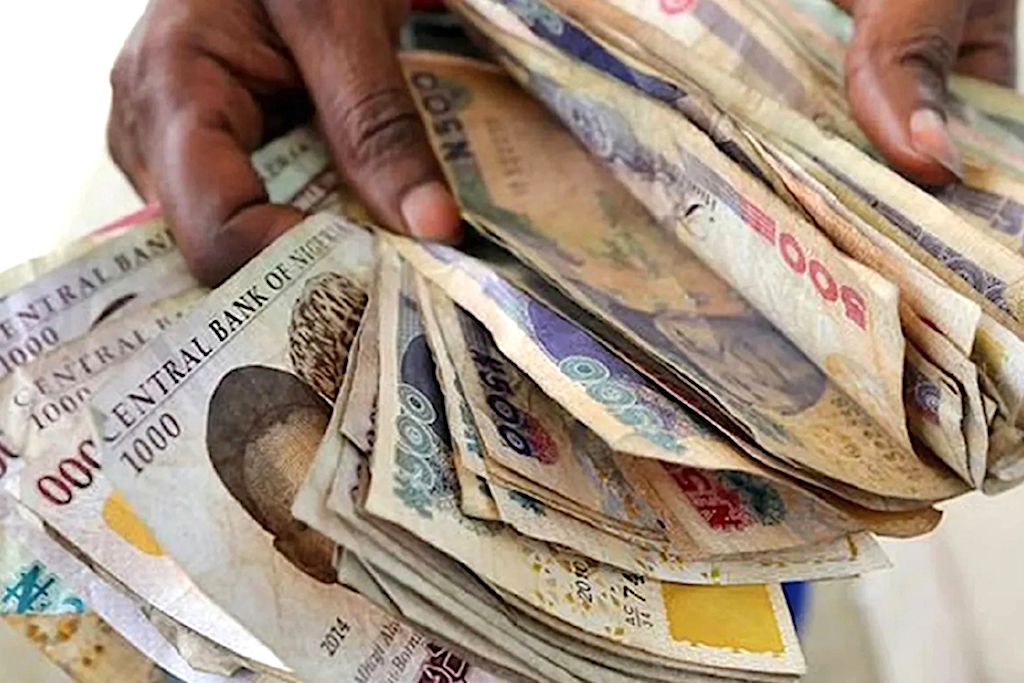Naira hits all-time low on black market
The naira fell to a historic low against the US dollar in the unauthorized market on Thursday, according to information collected from currency traders across the country.
In Lagos, currency traders around the Ikeja axis said the dollar was trading at 935.00 naira to the dollar, while dealers in Abuja said it was trading at 950.00 naira for $1 on Thursday, down from 915 naira and 920.00 naira. in the previous session on Wednesday.
Similarly, Uyo currency traders said the dollar was trading at N938.00 and N940.00 to the dollar on Thursday, amid a surge in demand.
>However, the local currency appreciated slightly against the dollar on the Investors and Exporters (I&E) window on Thursday, according to market data published on the FMDQ website.
Reacting to this, Razaq Fatai, an Abuja-based economist, said the main catalyst for the decline in the value of the currency is the scarcity of dollars amid growing demand.

Historically, he said, Nigeria's foreign exchange came primarily through three channels, namely crude oil exports, remittances and investment flows. He argued that unfortunately the three channels, especially crude oil exports, have proven insufficient to meet the growing demand.
Notably, average crude oil production for the first half of this year of approximately 1.2 million barrels per day (mbpd) is significantly below our historical average of 2.2 mbpd and the quota. OPEC's 1.74 mbpd,” he said.
Mr. Fatai said the loss of confidence in the national currency has led Nigerians to take an unfavorable stance on the naira, causing them to prefer to hold their savings in dollars.

To counter this trajectory and ensure exchange rate stability, Fatai said fundamental change hinged on increasing exports, particularly by increasing oil production and facilitating non-oil exports.
“Addressing the problem of oil theft is crucial to increasing oil production levels. At the same time, removing non-tariff barriers in trade in non-oil commodities is essential,” he said.
Meanwhile, at the official counter, market data released on Thursday showed that the naira closed at 781.34 naira against 782.38 naira per $1 recorded on Wednesday.
Thursday's rate implies an appreciation of 0.13% from the 782.38 naira per $1 recorded in the previous session on Wednesday.
Support PREMIUM TIMES integrity and credibility journalism Good journalism is very expensive. Yet only good journalism can guarantee the possibility of a good society, an accountable democracy and a transparent government. For continued free access to the best investigative journalism in the country, we ask that you consider your modest support of this noble endeavour.
TEXT ANNOUNCEMENT: Call Willie - +2348098788999

The naira fell to a historic low against the US dollar in the unauthorized market on Thursday, according to information collected from currency traders across the country.
In Lagos, currency traders around the Ikeja axis said the dollar was trading at 935.00 naira to the dollar, while dealers in Abuja said it was trading at 950.00 naira for $1 on Thursday, down from 915 naira and 920.00 naira. in the previous session on Wednesday.
Similarly, Uyo currency traders said the dollar was trading at N938.00 and N940.00 to the dollar on Thursday, amid a surge in demand.
>However, the local currency appreciated slightly against the dollar on the Investors and Exporters (I&E) window on Thursday, according to market data published on the FMDQ website.
Reacting to this, Razaq Fatai, an Abuja-based economist, said the main catalyst for the decline in the value of the currency is the scarcity of dollars amid growing demand.

Historically, he said, Nigeria's foreign exchange came primarily through three channels, namely crude oil exports, remittances and investment flows. He argued that unfortunately the three channels, especially crude oil exports, have proven insufficient to meet the growing demand.
Notably, average crude oil production for the first half of this year of approximately 1.2 million barrels per day (mbpd) is significantly below our historical average of 2.2 mbpd and the quota. OPEC's 1.74 mbpd,” he said.
Mr. Fatai said the loss of confidence in the national currency has led Nigerians to take an unfavorable stance on the naira, causing them to prefer to hold their savings in dollars.

To counter this trajectory and ensure exchange rate stability, Fatai said fundamental change hinged on increasing exports, particularly by increasing oil production and facilitating non-oil exports.
“Addressing the problem of oil theft is crucial to increasing oil production levels. At the same time, removing non-tariff barriers in trade in non-oil commodities is essential,” he said.
Meanwhile, at the official counter, market data released on Thursday showed that the naira closed at 781.34 naira against 782.38 naira per $1 recorded on Wednesday.
Thursday's rate implies an appreciation of 0.13% from the 782.38 naira per $1 recorded in the previous session on Wednesday.
Support PREMIUM TIMES integrity and credibility journalism Good journalism is very expensive. Yet only good journalism can guarantee the possibility of a good society, an accountable democracy and a transparent government. For continued free access to the best investigative journalism in the country, we ask that you consider your modest support of this noble endeavour.
TEXT ANNOUNCEMENT: Call Willie - +2348098788999
What's Your Reaction?






















